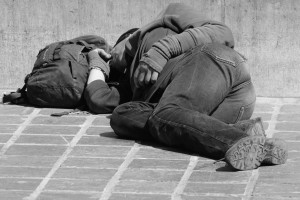Contributor: Cove Forge clinical content team member Hugh C. McBride.
 The prevalence of prescription drug abuse skyrocketed in the first years of the 21st century and so has homelessness. Among the many reasons for this unfortunate development is the mistaken belief, held by many, that because these substances have legitimate medical uses, their intentional misuse is somehow safer than is the recreational abuse of illegal drugs such as cocaine and heroin.
The prevalence of prescription drug abuse skyrocketed in the first years of the 21st century and so has homelessness. Among the many reasons for this unfortunate development is the mistaken belief, held by many, that because these substances have legitimate medical uses, their intentional misuse is somehow safer than is the recreational abuse of illegal drugs such as cocaine and heroin.
Prescriptions are Everywhere
Years of unacceptably high rates of prescription drug abuse have clearly demonstrated that the intentional misuse of opioids, benzodiazepines, central nervous system depressants, and similar medications is far from harmless. From temporarily diminished functioning to irreversible long-term damage, the destruction to users’ physical and mental health has been well documented. What many people fail to understand, though, is that the devastation of this type of substance abuse is not limited to users’ minds and bodies.
 It is not uncommon for individuals who engage in chronic abuse of prescription drugs to experience myriad social, occupational, and financial setbacks, including academic failure, unemployment, incarceration, and homelessness.
It is not uncommon for individuals who engage in chronic abuse of prescription drugs to experience myriad social, occupational, and financial setbacks, including academic failure, unemployment, incarceration, and homelessness.
Yes, you read that last sentence correctly. One of the many detrimental effects of prescription drug abuse is homelessness.
In the United States, experts estimate that more than 500,000 Americans are forced to sleep outdoors or in an emergency shelter or transitional housing program on a given day. Individuals and families experience homelessness for a variety of reasons, including job loss, unforeseen financial crisis, medical emergency or disability, family dissolution, and substance abuse.
Homelessness Under the Radar
 No one is citing prescription drug abuse, or any form of substance abuse, for that matter, as the sole cause of homelessness, a problem that has plagued society for generations. But it is a significant contributor to the problem. For example, a survey conducted in 2008 revealed that substance abuse is the single largest cause of homelessness among single adults and is among the top three most common causes of homelessness among families. In a separate study that was published the previous year, more than two-thirds of homeless individuals told researchers that the abuse of alcohol and other drugs was a major factor in their homelessness.
No one is citing prescription drug abuse, or any form of substance abuse, for that matter, as the sole cause of homelessness, a problem that has plagued society for generations. But it is a significant contributor to the problem. For example, a survey conducted in 2008 revealed that substance abuse is the single largest cause of homelessness among single adults and is among the top three most common causes of homelessness among families. In a separate study that was published the previous year, more than two-thirds of homeless individuals told researchers that the abuse of alcohol and other drugs was a major factor in their homelessness.
For people like David Loffert, the path from prosperity to homelessness started with prescription drug abuse. Loffert, whose book, From Hopkins to Homeless: My True Story of Prescription Drug Addiction, tells the story of his descent into addiction and homelessness, was an established expert in respiratory medicine when he started abusing prescription pain medication after being over-prescribed by a doctor who was treating him for migraine headaches. Loffert’s misuse of prescription medications led him into a nine-year addiction that included one suicide attempt, multiple overdoses, and an extended period of homelessness.
Eventually, David Loffert was able to overcome his addiction, regain control of his behaviors, and resume a productive and satisfying professional career. For too many people, though, their story of prescription drug abuse and homelessness does not have a similarly happy ending.
Overdose
 According to the National Institute on Drug Abuse, prescription drug overdose is now the leading cause of overdose deaths among homeless Americans, with opioid-based medications accounting for a stunning 81 percent of overdose deaths within this population. Since prescription drug abuse can wreak such devastation on a person’s mental and physical health, and since homeless individuals are particularly vulnerable to such issues, the impact of prescription drug abuse and addiction is clearly far more widespread than is suggested even by these profoundly troubling overdose statistics.
According to the National Institute on Drug Abuse, prescription drug overdose is now the leading cause of overdose deaths among homeless Americans, with opioid-based medications accounting for a stunning 81 percent of overdose deaths within this population. Since prescription drug abuse can wreak such devastation on a person’s mental and physical health, and since homeless individuals are particularly vulnerable to such issues, the impact of prescription drug abuse and addiction is clearly far more widespread than is suggested even by these profoundly troubling overdose statistics.
If you or someone you care about has been abusing prescription drugs, either as a way of self-medicating or for purely recreational purposes, do not delude yourself into believing that this is not a profoundly dangerous behavior. Regardless of one’s education, intelligence, or current socioeconomic status, the abuse of prescription medications can be the beginning of an inescapable downward spiral. Treatment options are available that can help you or the person you care for develop the tools needed to overcome the addiction and successfully move forward towards a bright, happy, and recovered life.
About the Author:
“When Prescription Drug Abuse Leads to Homelessness” was written by Cove Forge clinical content team member Hugh C. McBride. Hugh has several years of experience researching and writing on a wide range of topics related to behavioral healthcare. He has a Bachelor of Arts degree from Grove City College.
About the Program:
Located in the beautiful countryside of Williamsburg, Pennsylvania, Cove Forge Behavioral Health provides life-changing residential and partial hospitalization (PHP) treatment for adults who are struggling with chemical dependency and certain co-occurring disorders. Specialized treatment options at Cove Forge include inpatient non-hospital detox, a dual diagnosis program, and the H.O.P.E. opiate program. Licensed by the State of Pennsylvania’s Department of Drug & Alcohol Programs and nationally accredited by the Commission on Accreditation of Rehabilitation Facilities (CARF), Cove Forge employs evidence-based research and individualized programming that is designed to help each recovering individual realize his or her full potential while successfully maintaining lifelong recovery.
The opinions and views of our guest contributors are shared to provide a broad perspective of addictions. These are not necessarily the views of Addiction Hope, but an effort to offer a discussion of various issues by different concerned individuals.
We at Addiction Hope understand that addictions result from multiple physical, emotional, environmental, and genetic factors. If you or a loved one are suffering from an addiction, please know that there is hope for you, and seek immediate professional help.
Published on September 16, 2015
Reviewed and Updated by Jacquelyn Ekern, MS, LPC on January 4, 2021
Published on AddictionHope.com
